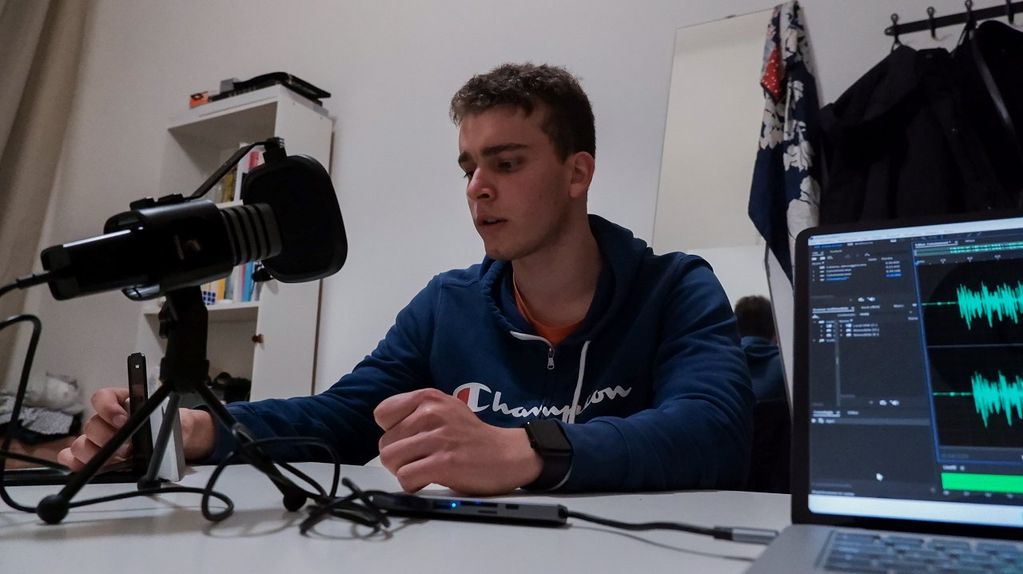Video essay On the edge of history
In February and March 2023, a workshop produced by Kinoatelje and executed in cooperation with the Gorizian I. S. I. S. S. G. D'Annunzio - M. Fabiani secondary school took place as a part of the project EAST / WEST: The border in film and history, which is supported by the Friuli Venezia Giulia region. The workshop took place in four meetings during regular school hours and was attended by students of the 5th ALS class and professors Alessandra Nardon (Italian and history) and Franca La Stella (English). The meetings were led by Antonio Dagostin and Lucia Giacomazzi (film students at the University of Udine), who, together with the students, visually and historically studied parts of video material taken from Aljoša Žerjal’s "No al bilingiusmo", which is kept by Kinoatelje and was digitized by the university restoration workshop La Camera Ottica. Together they reflected on what remains today of the eastern border.
With an introduction to the selected historical period, Professor Nardon presented the students with the historical background, on the basis of which they built their research.
The first two meetings that took place in the classroom were of a more theoretical nature. Antonio and Lucia presented the characteristics and methods of propaganda in newsreels, how the structure of a video essay is composed, what are the different types of these, and above all, how the preparation of their final product will take place.
In the third and fourth meeting, the students were divided into four groups and each was assigned a single meaningful clip from Žerjal's collection, which was previously selected by the Kinoatelje team and the professors. While studying the video material, the students reflected on it and developed accompanying texts, which were created on the basis of historical research and visual analysis and were used for the voice-over in the video essay.
The students showed a high degree of maturity and commitment during class and when doing homework. They gave constructive answers to the questions asked. They were an easy group to manage and did not hesitate to ask questions or ask for further clarification.
"Our intention was to make students aware that in the area where they were born and where they are growing up, a special and unique historical period (although we can still feel its consequences) recently ended, of which they themselves are the heirs. It is very important that young people are able to recognize hidden messages in all the images that surround us on a daily basis and the meaning they carry,” say Antonio and Lucia.
Announcements/
Catalogue and Screenings of the Project Oriente Vzhod / Occidente Zahod
04. 09. 2025On Friday, 5 September 2025, at 11:00, at Café Maks in Nova Gorica, within the framework of the Mesto knjige (City of Books) festival, the catalogue Oriente Vzhod / Occidente Zahod – The Border Through Film and History will be presented. The event is part of the “café matinées” series, which offers relaxed yet in-depth encounters with authors, thinkers, and creators.
Retrospective on the Move: The First Cross-Border Waypoints of Our Film Journey
18. 07. 2025Retrospective Oriente Vzhod / Occidente Zahod – Border Through Film and History, part of the official programme of the European Capital of Culture GO! 2025, launched its international tour in the first half of 2025. By July, it had visited eight countries and presented 31 films across 54 screenings, ranging from classics of Slovenian and Italian cinema to contemporary festival highlights, documentary essays and animated films.
Filmska umetnost kot orodje preseganja meja
09. 04. 2025Nekatere meje so vidne, druge nevidne. Nekatere ločujejo, druge združujejo. Obmejna regija med Slovenijo in Italijo je bila stoletja prizorišče prepletanja kultur, zgodovinskih preobratov in človeških usod. Lahko zgodovino pogledamo skozi film in jo razumemo skozi umetnost? Retrospektiva Oriente Vzhod / Occidente Zahod – Meja skozi film in zgodovino, ki jo Kinoateje organizira v sodelovanju s številnimi partnerji in je del uradnega programa Evropske prestolnice kulture GO! 2025 ponuja prav to – potovanje skozi filmske podobe, ki raziskujejo življenje na robu in središču Evrope hkrati.


